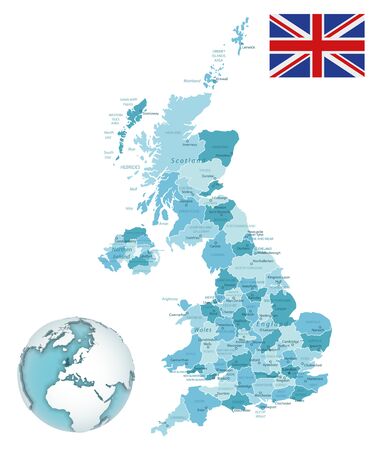Introduction: Understanding Devolution and Income Tax
Devolution has played a significant role in shaping the way income tax is regulated across the United Kingdom. Over the past few decades, the UK government has granted varying degrees of legislative power to Scotland, Wales, and Northern Ireland, allowing them to make decisions on certain policy areas that were previously controlled centrally from Westminster. One major area affected by this shift is income tax. As a result, residents in England, Scotland, Wales, and Northern Ireland may find themselves subject to different tax rules and rates depending on where they live. This article provides an overview of how devolution has enabled these differences, setting the stage for a deeper exploration into the specific income tax systems across each nation within the UK.
2. Income Tax Structures by Region
Devolution has given Scotland, Wales, and Northern Ireland a degree of control over their own income tax systems, resulting in notable differences across the UK. While England and Northern Ireland follow the structure set by the UK government, Scotland and Wales have introduced their own rates and thresholds for certain bands. Understanding these variations is crucial for anyone living, working, or planning finances in different parts of the UK.
UK-Wide Overview
The table below provides a summary of the current (2024/25) income tax bands, rates, and thresholds in each country:
| Country | Basic Rate (%) | Basic Rate Band (£) | Higher Rate (%) | Higher Rate Band (£) | Additional/Top Rate (%) | Additional/Top Rate Band (£) |
|---|---|---|---|---|---|---|
| England & NI | 20% | 12,571 – 50,270 | 40% | 50,271 – 125,140 | 45% | Over 125,140 |
| Scotland | 19% (Starter) 20% (Basic) 21% (Intermediate) |
12,571 – 14,876 14,877 – 26,561 26,562 – 43,662 |
42% (Higher) | 43,663 – 125,140 | 47% (Top) | Over 125,140 |
| Wales | 20% | 12,571 – 50,270 | 40% | 50,271 – 125,140 | 45% | Over 125,140 |
Northern Ireland Note
Northern Ireland currently follows the same structure as England for income tax purposes. However, its important to remember that devolved powers could enable changes in future years.
Main Differences and Similarities
– Scotland: Has five income tax bands with lower starter rates but higher top rates compared to other regions. The intermediate band is unique to Scotland.
– Wales: Introduced Welsh Rates of Income Tax but currently mirrors Englands rates and thresholds.
– Northern Ireland: No divergence from England so far.
These regional differences mean that your take-home pay can vary depending on where you live in the UK. Its always wise to check which rates apply before making major financial decisions such as moving or changing jobs.

3. Everyday Impact on Take-Home Pay
When it comes to monthly pay packets, the differences in income tax rates across England, Scotland, Wales, and Northern Ireland can have a noticeable effect on what actually lands in your bank account each month. For many UK residents, the take-home pay is not just about your gross salary—it’s also about how much you’re left with after HMRC takes its share. Because Scotland has introduced its own bands and rates, for example, someone earning a mid-level salary might see a smaller or larger deduction compared to their friends down south. This directly impacts disposable income—the money left over for rent or mortgage payments, utility bills, groceries, and those little extras like a Friday night takeaway or a pint at the local pub.
For families and individuals trying to budget, these tax variations can really add up over time. A teacher living in Edinburgh may notice their monthly payslip looks different from a counterpart in Cardiff or Belfast, even if their base salary is identical. Over the course of a year, these small differences can mean hundreds of pounds either saved or spent elsewhere. It’s also worth noting that local services—council tax rates, for instance—might vary by region as well, further shaping how far your income will stretch depending on where you live. So when planning your personal finances or considering a move within the UK, it’s wise to factor in these regional tax nuances—not just for big purchases but for everyday budgeting too.
4. Personal Finances: Saving and Budgeting Tips
Understanding how devolution affects income tax rates across the UK is vital for your everyday budgeting and saving strategy. Whether you live in England, Scotland, Wales, or Northern Ireland, small differences in income tax bands and available allowances can have a noticeable impact on your take-home pay—and therefore, your monthly budget.
Make the Most of Your Regional Allowances
Each UK nation sets its own tax thresholds and bands, which means your region may offer different personal allowances or reliefs. For example, Scotland has its own set of income tax bands, while Wales and Northern Ireland generally follow the rest of the UK’s structure. Be sure to check what applies to you so you don’t miss out on any savings opportunities.
Current Personal Allowances by Region (2024/25)
| Region | Personal Allowance (£) | Notes |
|---|---|---|
| England | 12,570 | Standard UK allowance |
| Scotland | 12,570 | Same as UK but different tax bands above this level |
| Wales | 12,570 | Follows UK standard allowance |
| Northern Ireland | 12,570 | Follows UK standard allowance |
Clever Budgeting Across the UK Nations
Your net income will depend on where you live and work. If you are close to a border (for example, living in England but working in Scotland), double-check which nation’s rules apply to you—usually it’s based on your main address. Review your payslips to ensure the correct tax code is used.
- Track Your Net Pay: Use an online salary calculator tailored to your region to estimate your post-tax income.
- Adjust Your Savings Rate: If you pay higher rates (like in Scotland), increase your savings where possible to offset the difference.
- Pension Contributions: Remember that contributing more to your pension can lower your taxable income—especially useful if you’re near a higher tax threshold.
- ISA Allowances: All regions share the same ISA limit (£20,000 for 2024/25), so make full use of this tax-free saving opportunity regardless of where you live.
- Marriage Allowance: If eligible, transfer unused personal allowance between spouses or civil partners for extra savings—available across all four nations.
Savvy Tip: Check Local Reliefs and Benefits
Certain local councils may also offer benefits or support schemes specific to residents of their area—such as council tax reductions or energy rebates. Always keep an eye on regional government websites for updates that could help ease your monthly bills.
5. Case Studies: Real-Life Examples
Devolution has introduced notable differences in income tax rates and bands across the UK’s four nations, prompting households to rethink their financial strategies. Here, we spotlight real-life examples from England, Scotland, Wales, and Northern Ireland, showing how everyday people are adapting to these changes.
Adapting in Scotland: The Dual-Income Family
Take the case of the Thompsons in Edinburgh—a dual-income family where both parents work full-time. With Scotland’s distinct income tax bands, they noticed a higher deduction on one salary compared to friends living just over the border in England. To manage the impact, they’ve increased pension contributions (which are tax-deductible), and started budgeting more rigorously for childcare and essentials. They also regularly use comparison sites to ensure they’re getting the best deals on utilities and insurance.
England’s Freelancers: Making the Most of Allowances
Meanwhile, in Manchester, Sarah is a freelance graphic designer. As English rates remain aligned with UK-wide thresholds, she takes advantage of personal allowances and stays informed about national changes via HMRC updates. She’s set up a savings account specifically for her annual tax bill and tracks expenses closely using budgeting apps—helping her save money throughout the year.
Welsh Homeowners: Navigating Slight Differences
The Evans family in Cardiff have found that while Welsh income tax rates don’t currently differ much from England’s, they’re keeping an eye on any future devolved changes. Meanwhile, they focus on maximising their take-home pay by claiming eligible reliefs and credits, such as Marriage Allowance and Child Benefit. They also take part in local community swap shops and discount schemes to stretch their budget further.
Northern Ireland: Planning for Stability
John, a civil servant in Belfast, appreciates that Northern Ireland follows UK-wide tax rates. However, he’s aware of potential future changes due to devolution discussions. To protect his finances against possible fluctuations, John maintains an emergency fund and regularly reviews his monthly outgoings—cutting back on subscriptions he no longer needs and shopping around for better deals on groceries and mobile contracts.
These stories highlight how people across the UK are not only aware of their local tax policies but also actively adapt their daily money management—whether it’s through clever budgeting, making use of allowances, or simply hunting down better bargains to offset any extra tax burden.
6. Future Trends and Considerations
As the UK continues to navigate the complex landscape of devolution, the future of income tax differences across England, Scotland, Wales, and Northern Ireland remains a hot topic for discussion. With each devolved government possessing varying degrees of fiscal autonomy, the potential for further divergence in tax policy is very real. Policymakers are increasingly aware that any changes to the devolved tax system could have significant implications for both individuals and businesses across the country.
Possible Shifts in Tax Policy
Looking ahead, we may see more frequent adjustments to tax bands and rates as devolved governments seek to tailor their systems to local needs. For example, Scotland has already demonstrated its willingness to introduce more progressive tax bands. Meanwhile, Wales and Northern Ireland may explore greater autonomy or innovative measures to boost local economies or fund public services. These shifts could lead to even greater variation in take-home pay depending on where you live in the UK.
What This Means for Residents
For everyday people, these changes underscore the importance of staying informed about your region’s tax policies. If you’re considering relocating within the UK—for work, family, or lifestyle reasons—the local income tax regime could affect your disposable income. Those who are self-employed or have multiple sources of income should pay particular attention to regional rules and allowances, as these could impact how much you owe HMRC at year-end.
Keeping an Eye on Westminster
While devolution allows for innovation and flexibility at a local level, decisions made at Westminster still have an overarching influence—especially regarding thresholds and allowances that apply nationwide. Any moves towards further devolution—or conversely, a push to standardise certain aspects of taxation—will be closely watched by both taxpayers and financial advisers alike.
The Importance of Financial Planning
With ongoing uncertainty and possible reforms on the horizon, UK residents are encouraged to adopt a proactive approach to personal finance. Keeping abreast of announcements from both national and devolved governments can help you plan ahead, maximise savings opportunities, and avoid any unpleasant surprises come tax season. In this ever-evolving environment, a little research goes a long way toward making your money work harder for you.


